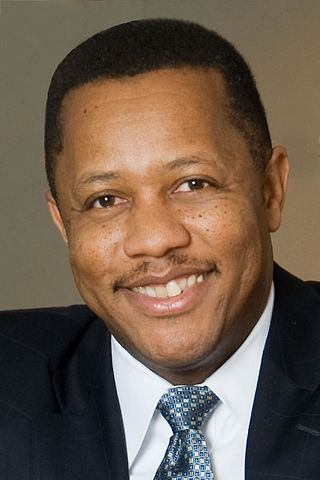Passive management is an investing strategy that tracks a market-weighted index or portfolio. Passive management is most common on the equity market, where index funds track a stock market index, but it is becoming more common in other investment types, including bonds, commodities and hedge funds.
An index fund is a mutual fund or exchange-traded fund (ETF) designed to follow certain preset rules so that it can replicate the performance ("track") of a specified basket of underlying investments. While index providers often emphasize that they are for-profit organizations, index providers have the ability to act as "reluctant regulators" when determining which companies are suitable for an index. Those rules may include tracking prominent indices like the S&P 500 or the Dow Jones Industrial Average or implementation rules, such as tax-management, tracking error minimization, large block trading or patient/flexible trading strategies that allow for greater tracking error but lower market impact costs. Index funds may also have rules that screen for social and sustainable criteria.
A mutual fund is an investment fund that pools money from many investors to purchase securities. The term is typically used in the United States, Canada, and India, while similar structures across the globe include the SICAV in Europe, and the open-ended investment company (OEIC) in the UK.

Value investing is an investment paradigm that involves buying securities that appear underpriced by some form of fundamental analysis. Modern value investing derives from the investment philosophy taught by Benjamin Graham and David Dodd at Columbia Business School starting in 1928 and subsequently developed in their 1934 text Security Analysis.
Peter Lynch is an American investor, mutual fund manager, author and philanthropist. As the manager of the Magellan Fund at Fidelity Investments between 1977 and 1990, Lynch averaged a 29.2% annual return, consistently more than double the S&P 500 stock market index and making it the best-performing mutual fund in the world. During his 13-year tenure, assets under management increased from US$18 million to $14 billion.
Market timing is the strategy of making buying or selling decisions of financial assets by attempting to predict future market price movements. The prediction may be based on an outlook of market or economic conditions resulting from technical or fundamental analysis. This is an investment strategy based on the outlook for an aggregate market rather than for a particular financial asset.
Investment management is the professional asset management of various securities, including shareholdings, bonds, and other assets, such as real estate, to meet specified investment goals for the benefit of investors. Investors may be institutions, such as insurance companies, pension funds, corporations, charities, educational establishments, or private investors, either directly via investment contracts/mandates or via collective investment schemes like mutual funds, exchange-traded funds, or Real estate investment trusts.
William H. Miller III is an American investor, fund manager, and philanthropist. He served as the chairman and chief investment officer of Legg Mason Capital Management as well as the principal portfolio manager of the Legg Mason Capital Management Value Trust. He is the portfolio manager of the former Legg Mason Opportunity Trust mutual funds, now housed at his own firm Miller Value Partners.

Dodge & Cox is an American mutual fund company, founded in 1930 by Van Duyn Dodge and E. Morris Cox, that provides professional investment management services.

T. Rowe Price Group, Inc. is an American publicly owned global investment management firm that offers funds, subadvisory services, separate account management, and retirement plans and services for individuals, institutions, and financial intermediaries. The firm has assets under management of more than $1.51 trillion and annual revenues of $6.48 billion as of 2023, placing it 537 on the Fortune 1000 list of the largest U.S. companies. Headquartered at 100 East Pratt Street in Baltimore, Maryland, it has 7,868 employees across 17 international offices serving clients in 55 countries.

Socially responsible investing (SRI) is any investment strategy which seeks to consider financial return alongside ethical, social or environmental goals. The areas of concern recognized by SRI practitioners are often linked to environmental, social and governance (ESG) topics. Impact investing can be considered a subset of SRI that is generally more proactive and focused on the conscious creation of social or environmental impact through investment. Eco-investing is SRI with a focus on environmentalism.
Dimensional Fund Advisors, L.P. is a privately-owned investment firm headquartered in Austin, Texas. Dimensional was founded in Brooklyn in 1981 by David Booth, Rex Sinquefield and Larry Klotz. The company has 15 international offices in the U.S., Canada, U.K., Germany, Netherlands, Australia, Singapore, and Japan. Dimensional maintains additional U.S. offices in Charlotte, North Carolina and Santa Monica, California.

An alternative investment, also known as an alternative asset or alternative investment fund (AIF), is an investment in any asset class excluding capital stocks, bonds, and cash.
Louis G. Navellier is Chairman and Founder of Navellier & Associates in Reno, Nevada, which manages approximately $1.0 billion in assets. Navellier also writes five investment newsletters focused on growth investing: Growth Investor, Breakthrough Stocks, Accelerated Profits, Power Options and Platinum Growth Club, and can frequently be seen giving his market outlook and analysis on Bloomberg, Fox News, and CNBC.
Thomas H. Forester is an American mutual fund manager. He was the only long-focused United States stock mutual fund manager to make a profit in 2008. He turned a profit in the third quarter of 2002, during the stock market downturn of 2002 and was first in his asset class year-to-date through November 1, 2004.
Lord, Abbett & Co. LLC is an independent, privately-held investment management company headquartered in Jersey City, New Jersey. Lord Abbett has offices in Jersey City, Dubai, Dublin, London, Montevideo, Singapore, Tokyo, and Zurich.
A quantitative fund is an investment fund that uses quantitative investment management instead of fundamental human analysis.

Eugene A. Profit is an American investor, entrepreneur, philanthropist and former American football cornerback for the New England Patriots and Washington Redskins. He is the founder, president, CEO, and portfolio manager of Profit Investment Management, an investment management firm in the Washington, DC metropolitan area.

An investment fund is a way of investing money alongside other investors in order to benefit from the inherent advantages of working as part of a group such as reducing the risks of the investment by a significant percentage. These advantages include an ability to:
Discretionary investment management is a form of professional investment management in which investments are made on behalf of clients through a variety of securities. The term "discretionary" refers to investment decisions being made by the investment manager based on the investment manager's judgement rather than under the direction of the client. The major aim of the services offered is to outperform benchmarks listed in the mandate; this is called providing alpha.







